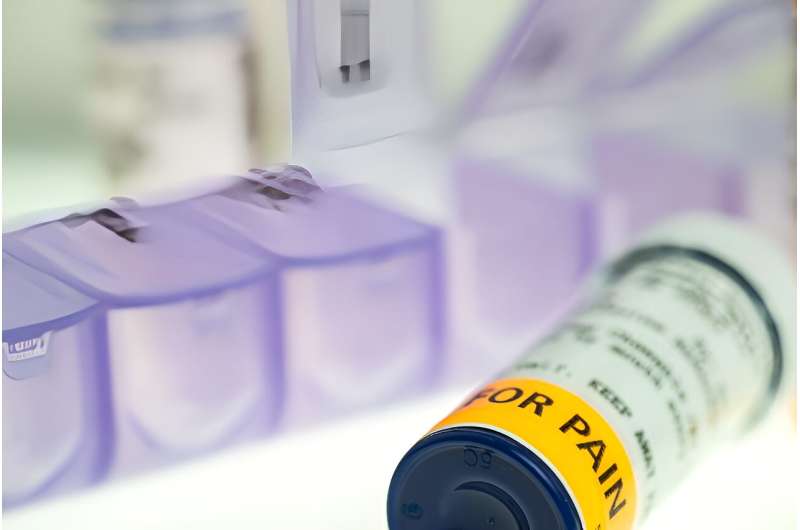This article has been reviewed according to Science X's editorial process and policies. Editors have highlighted the following attributes while ensuring the content's credibility:
fact-checked
reputable news agency
proofread
Experimental pain med could give patients new option to opioids

The first new kind of pain medication in over two decades could be on the horizon for patients, with promising results announced Tuesday from a company trial.
For now, the drug from Vertex Pharmaceuticals is called VX-548. But in trials of patients undergoing abdominoplasties (tummy tucks) and foot bunion surgeries, VX-548 performed better than placebo at easing post-op pain, with no major safety issues seen.
It didn't bring superior pain relief compared with the opioid Vicodin (hydrocodone bitartrate/acetaminophen), the trial found, but it scored similarly to Vicodin on a standard measure called the Numeric Pain Rating Scale.
"We are very pleased with the results from the VX-548 pivotal program, which demonstrate a compelling and consistent combination of efficacy and safety across multiple acute pain conditions and settings," Vertex President and CEO Dr. Reshma Kewalramani said in a company statement.
She noted that the drug is already being fast-tracked for U.S. Food and Drug Administration approval, and said Vertex is "working with urgency to ... bring this non-opioid medicine to the millions of patients who suffer from acute pain each year in the U.S."
Millions of patients worldwide are in need of some kind of alternative to opioid medications, which work well to ease pain but come with serious risks for addiction and abuse.
"As a physician treating patients suffering from pain for many years, I know firsthand the critical need for new, efficacious and safe treatment options," Dr. Jessica Oswald, an associate physician in emergency medicine and pain medicine at the University of California, San Diego, said in the Vertex news release. She's also a member of the Vertex Acute Pain Steering Committee.
She called the findings on VX-548 "impressive," with the "potential to change the paradigm of pain management. I look forward to the potential of having a new class of acute pain medicine—the first in more than two decades—to use as an alternative to opioids to help the millions of people impacted by acute pain."
Just how does VX-548 work?
As the company explained, the drugs doesn't work directly on the brain, but instead targets cellular processes within the peripheral nervous system.
More specifically, VX-548 targets a cellular mechanism called a sodium channel, in this case sodium channel NaV1.8.
NaV1.8 "plays a critical role in pain signaling in the peripheral nervous system," Vertex said.
In the new trial, Vertex enrolled about 1,100 people who'd undergone tummy tuck surgeries, and a similar number who'd had bunion surgeries.
Patients got either a placebo, Vicodin (every six hours for 42 hours) or VX-548—first at a dose of 100 milligrams (mg) and then again at a 50-mg dose every 12 hours for the next 36 hours. All were given in pill form.
On a standard measure gauging patients' pain intensity, VX-548 had scores that easily outperformed the placebo.
Compared to Vicodin, VX-548 was roughly equal in pain relief for the abdominoplasty patients, and less effective than Vicodin among the foot surgery patients.
But using the Numeric Pain Rating Scale, VX-548 and Vicodin showed similar pain reductions: 47% and 43%, respectively, for the tummy tuck patients, and 51% and 53%, respectively, for people who underwent the bunion surgeries.
As for safety, "VX-548 was generally well-tolerated in this study," the company said. "The majority of adverse events [AEs] were mild to moderate," with the most common issues involving nausea or constipation.
More information: Find out more about pain medications at the Cleveland Clinic.
2024 HealthDay. All rights reserved.





















